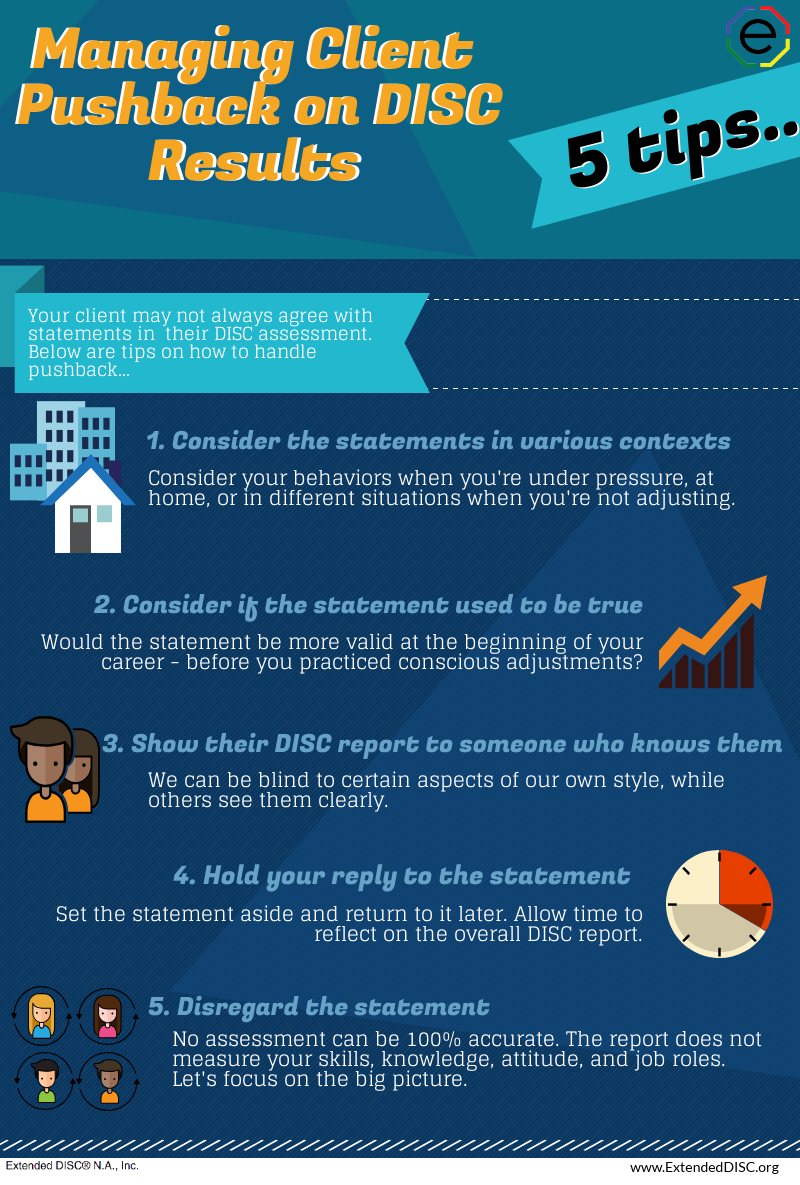Your client says, 'That's not me!' How prepared are you when they question their DISC results?
It's a given some clients will react strongly or pushback against their DISC assessment results. What should you do at this critical moment in the feedback session?
As their DISC facilitator, your focus is helping them use their results to build self-awareness and a clearer path to success. It is challenging when your client hasn't fully processed the feedback information, has blind spots, or is not ready to acknowledge aspects of who they are and how they show up to others.
Here are some tips to help you handle pushback.

Consider the statements in various contexts
Ask your client to think of themselves in various situations. For example, what was it like early on in their career when they didn't have the experience and skills they have now. DISC measures your hard-wired behavioral style, but it does not identify your knowledge, attitude, values, or skills.
Ask them to think about themselves in new situations or stressful situations, when they are less likely to adjust their behaviors. When you are feeling stronger emotions, you have less focus on adjusting because you are managing emotions. When reading your results, you are self-identifying your most comfortable ways of doing things and considering what tends to happen if you DON'T adjust.
Could the statement be true at one point?
Your DISC results focus on your preferred ways of doing things and not on your ability to do things. It does not predict your success nor does it limit your ability to be successful in anything you choose to do. In fact, it provides a behavioral roadmap on how to achieve personal success by predicting how you tend to do things and enabling you to make better decisions going forward.
Therefore, your results only show what naturally tends to happen until you consciously work on these areas of development. Ask them if the statement(s) would be more valid at the beginning of their career, before they practiced conscious adjustments? Congratulate them on overcoming challenges and learned behaviors that are needed for them to be successful.
Get feedback
Your clients are more likely to push back on specific statements rather than on the entire report. You are more likely to accept the positive feedback and question what you view as negative feedback. You may even ignore the positives and zero in on the one statement that rubs you wrong. Admit it, it's hard to publicly acknowledge your challenges.
Ideally, have your clients go through the report multiple times. As they do, ask them to highlight the statements which are spot on; meaning the statements accurately represent them. At the same time, they should mark the statements that they are unsure of or disagree with.
Next, they should give their report to others they trust; ask them to review the marked statements to see if they agree or not. Getting feedback can help your clients become more aware of their blind spots. Are they really coming across to others in ways they are not aware of? Everyone sees the world through their own lenses. You may consider yourself to be someone who gets things done quickly and decisively, but others are viewing you as inconsiderate and aggressive.
DISC helps you identify aspects of your style you do not see, while others see it clearly. The great news is your blind spots can provide you with the greatest opportunities for personal development.
Take time to reflect
As different styles, you see and react to your results differently. Some of you may have an emotional reaction, while others may simply need more time to process.
Have your clients go through their entire DISC report, even if it's quickly. Next, ask them to set aside statements they question or disagree with and return to it later. Having a chance for reflection can create lightbulb moments of self-awareness.
Focus on the big picture
There is no assessment that is going to be 100 percent accurate; you are too complex. The DISC Assessment describes your behavioral aspects; how you prefer to do things. Behaviors can be modified, often temporarily and briefly, to fit key situations.
You can ask them for examples of why they don't agree with a specific statement. You are allowing them to process their own feedback. There's a good chance your client agrees with the majority of the report; especially the parts focusing on their strengths.
Help them refocus and look at the broader scope. Ask them to focus on statements that would have the greatest impact on their interactions and productivity if addressed now. Remind them, the end goal is to make small changes in behaviors to have a big impact.
Always, remember to listen. If your client has shared, reconsidered, reflected, and still disagrees then say, “I hear you and I believe you." Your client knows themselves best; disregard the statement and focus on the big picture. In the end, it's about using the DISC results in the most beneficial way; to help your clients help themselves.
Are you feeling more prepared for pushback now? You got this!
